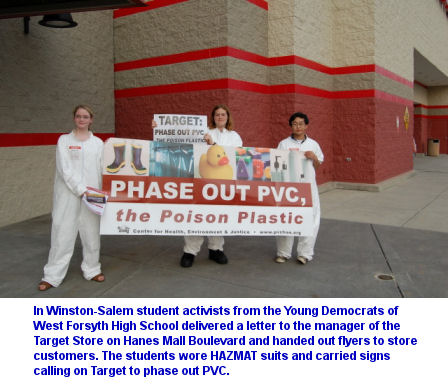|
*ATTN TV JOURNALISTS:
B-Roll is available*
FOR IMMEDIATE RELEASE
Wednesday, October 11, 2006
CONTACT:
David Mickey 336-769-0955
Sarah McManus 336-972-3835
Shayna Samuels 718-541-4785
Mike Schade 212-964-3680
Target Stores in Winston-Salem and
Nationwide Protested for Carrying Products and Packaging
Linked to Cancer and Birth Defects
More than 60 Health & Environmental Organizations
Urge Target to Join Wal-Mart, Microsoft and Other Retailers in
Phasing Out Dangerous PVC (Vinyl) Toys, Shower Curtains and Other Products and
Packaging
Massive Internet Campaign Released Featuring the
Hilarious “Sam Suds and the Case of PVC, the Poison
Plastic”
Winston-Salem, NC, Wednesday, October 11)
– Target stores in Winston-Salem and around the
country today faced concerned students, mothers,
scientists, environmentalists and customers who no longer
want to purchase products and packaging made with PVC,
commonly known as vinyl, sold by Target. Already
Wal-Mart, Nike, Microsoft, Ikea, H&M, and Johnson and
Johnson are phasing-out PVC, or polyvinyl chloride,
products and/or packaging due to serious health and
environmental problems. But Target has not responded to
over 60 environmental organizations who have been urging
the company since March 2006 to begin replacing these
hazardous materials with safe alternatives.
“Target may have the latest hip designs but their
aisles are filled with products made from dangerous
chemicals linked to cancer,” said Lois Gibbs,
Executive Director of the Center for Health, Environment
and Justice. “Target should phase out the poison
plastic and switch to readily-available, safe
alternatives, as other retailers and companies have
done.”
In Winston-Salem student activists from the Young
Democrats of West Forsyth High School delivered
a letter to the manager of the Target Store on Hanes Mall
Boulevard and handed out flyers to store customers. The
students wore HAZMAT suits and carried signs calling on
Target to phase out PVC.
Nearly 30 other Target stores nationwide faced
demonstrations today in CA, CT, FL, MA, MD, MI, NC, NJ,
NY, OK, OR, TX, VA, and WA. Also today a major Internet
campaign was launched at www.pvcfree.org
featuring a new spoof video “Sam Suds and
the Case of PVC, the Poison Plastic” made
by Webby Award winners, Free Range Studios. This video
encourages viewers to “take action” and sign a
petition to Target. So far, there has been no official
response from Target.
“Target claims to have taken steps to reduce waste
and protect the environment,” said Sarah Mcmanus,
spokesperson for the group. “But now Target’s
management, and Target’s customers, can watch the
Sam Suds video and take action to phase out PVC. The good
news is that there are safe alternatives to PVC.”
David Mickey, Zero Waste Coordinator for the Blue Ridge
Environmental Defense League added, “North Carolina
already landfills the 11th largest amount of PVC waste in
the country. With private companies planning to import
waste from other states, we could be moving up the
list.” The Blue Ridge Environmental Defense League,
based in Glendale Springs, is a member of the coalition
urging Target to phase out PVC.
Products at Target made with PVC include some
children’s toys, shower curtains, and packaging,
among many others. CHEJ has identified over 100 products
sold at Target packaged or made out of PVC.
What’s Wrong With PVC?
PRODUCTION PROBLEMS: The production of
PVC requires toxic chemicals, including highly
cancer-causing vinyl chloride monomer and ethylene
dichloride. “PVC plants have poisoned the air, water
and soil of our communities,” said Edgar Mouton,
President of Mossville Environmental Action Now in
Louisiana, where half of the U.S. PVC production
facilities are located. “These plants are
disproportionately located near low-income communities of
color and have had devastating effects on our health and
the environment.”
USAGE PROBLEMS: Additives mixed with PVC
can leach out of, or volatize from, a PVC product. An EPA
study found one new vinyl shower curtain can lead to
elevated levels of indoor air toxics for over one month.
Our bodies are contaminated with poisonous chemicals
released during the PVC lifecycle such as mercury,
dioxins and phthalates, which may pose irreversible
lifelong health threats.
RECYCLING PROBLEMS: When PVC products
are mixed in with recycling of non-chlorinated plastics,
such as in bottle recycling programs, they contaminate
the entire recycling process. In fact just one PVC bottle
can contaminate a recycling load of 100,000 soda bottles.
DISPOSAL PROBLEMS: As much as 7 billion
pounds of PVC are discarded every year in the U.S.
Dumping of PVC in landfills poses long-term problems from
leaching of toxic additives into the groundwater,
dioxin-forming landfill fires and toxic landfill gases.
When produced or burned PVC plastic forms dioxins, a
highly toxic group of chemicals that build up in the food
chain. The U.S. EPA classified the most potent of the
dioxins as a human carcinogen. Dioxins are also
associated with altered sexual development, reproductive
problems, diabetes and organ toxicity.
What’s the Solution?
REPLACE PVC WITH SAFE ALTERNATIVES:
Adidas, Bath & Body Works, the Body Shop, Crabtree
& Evelyn, Firestone Building Products Company,
Gerber, Honda, HP, Ikea, Johnson & Johnson, Kaiser
Permanente, Lego Systems, Microsoft, Nike, Samsung, Shaw
Industries, Toyota, Volkswagen, Volvo, and Wal-Mart are
among the many companies who are phasing out PVC in
products and/or packaging. Safer alternatives are widely
available and effective for virtually all major uses in
building materials, medical products, packaging, office
supplies, toys and consumer goods.
DON’T BUY PRODUCTS MADE OF PVC:
Products made out of PVC are often referred to as vinyl.
Remember, bad news comes in threes. One way to be sure if
packaging is made from PVC is to look for the number
“3” inside, or the letter “V”
underneath, the universal recycling symbol.
CHANGE POLICIES: Policy makers at the
local, state and federal levels should enact and
implement laws that steadily phase out the production,
use, and disposal of PVC and lead to a complete phase-out
and just transition of PVC.
|

